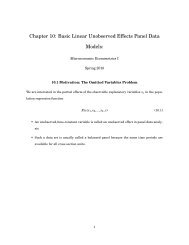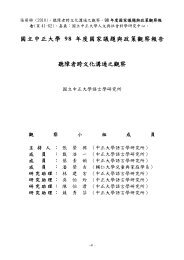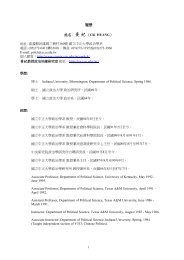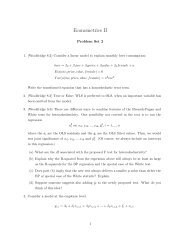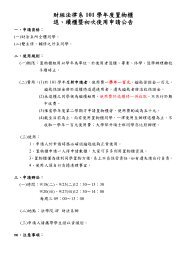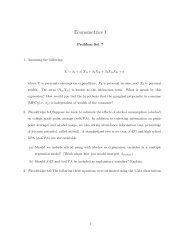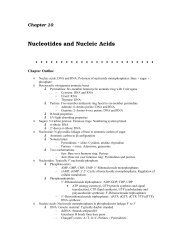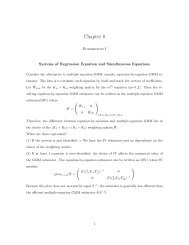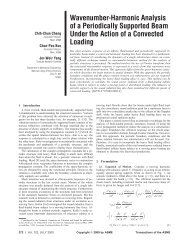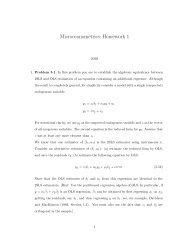Slides
Slides
Slides
Create successful ePaper yourself
Turn your PDF publications into a flip-book with our unique Google optimized e-Paper software.
development", Journal of Child Language 24: 187-219.<br />
MacWhinney, B. (1982). "Basic syntactic processes", in S. Kuczaj III ed. Language<br />
Development Vol. 1: syntax and semantics. Hillsdale, NJ: Lawrence Erlbaum.<br />
Maratsos, Michael and M. Chalkley (1980) "The internal language of children's syntax: the<br />
ontogenesis and representation of syntactic categories," in K. Nelson (ed.) Children's<br />
Language. vol. 2. New York: Gardner Press.<br />
Mintz, Toben ( 2003) “Frequent frames as a cue for grammatical categories in child directed<br />
speech” Cognition 90 (2003) 91-117.<br />
Mintz, Toben, Elissa Newport, and Thomas Bever (1995) "Distributional regularities of form<br />
class in speech to young children," in J. Beckman (ed) Proceedings of the North East<br />
Linguistics Society 25 (vol. 2): 43-54. Amherst, MA: GSLA.<br />
Newport, Elissa (1990) "Maturational constraints on language learning", in Paul Bloom (ed)<br />
1993. Language Acquisition: core readings. Cambridge, MA: MIT Press. pp. 543-560.<br />
Pine, J. and E. Lieven (1993). "Reanalyzing rote-learned phrases: individual differences in the<br />
transition to multi-word speech", Journal of Child Language 20: 551-571.<br />
Pine, J., E. Lieven and C. Rowland (1998) "Comparing different models of the development<br />
of the English verb category," Linguistics 36.4: 807-830.<br />
Pinker, S. (1987). “The boostrapping problem in language acquisition”, in B. MacWhinney<br />
(ed) Mechanisms of Language Acquisition. Hillsdale, NJ: Lawrence Erlbaum.<br />
Poeppel, D. and K. Wexler (1993). "The full competence hypothesis of clause structure in<br />
early German", Language 69.1: 365-424.<br />
Schlesinger, I. (1982) "Semantic assimilation in the development of relational categories," in<br />
W. Deutsche (ed.) The Child's Construction of Language. New York: Academic Press.<br />
Tomasello, M. (1992). First Verbs: a case study of early grammatical development. London:<br />
Cambridge University Press.<br />
Tomasello, M. (2000a). "Do young children have adult syntactic competence" Cognition 74:<br />
209-253.<br />
Tomasello, Michael (2003) Constructing a Language-a usage-based theory of language<br />
acquisition. Cambridge, Massachusetts: Harvard University Press.<br />
Valian, V. (1986) “Syntactic categories in the speech of young children”, Developmental<br />
Psychology 22.4: 562-579.<br />
Valian, V. (1991) "Syntactic subjects in the early speech of American and Italian children,"<br />
Cognition 40: 21-81.<br />
Wexler, K. (1993) "Optional infinitives, head movement and the economy of derivations", in<br />
N. Hornstein and D. Lightfoot (eds) Verb Movement. Cambridge University Press.<br />
Wexler, Kenneth (1998) "Very early parameter setting and the unique checking constraint: a<br />
new explanation of the optional infinitive stage," Lingua 106: 23-79.<br />
Wexler, Kenneth (2003) "Lenneberg's dream: learning, normal language development, and<br />
specific language impairment," in Y. Levy and J. Schaeffer (eds.) Language Competence<br />
Across Populations: Toward a Definition of Specific Language Impairment. Mahwah, NJ:<br />
Lawrence Erlbaum.<br />
Wong, Sin Ping (1998) "The Acquisition of Cantonese Noun Phrases". PhD dissertation,<br />
University of Hawaii.<br />
Xiao, Ling (2006) Category and Productivity in the Early Development of Verb Argument<br />
Structures in Chinese. MA thesis, Dept of Linguistics, Hunan University.<br />
Xiao, Ling, Xin Cai, and T. Lee (2006) "The development of the verb category and verb<br />
argument structure in children before two years of age," in Yukio Otsu (ed.) Proceedings<br />
of the Seventh Tokyo Conference on Psycholinguistics. Tokyo: Hituzi Syobo.<br />
15



